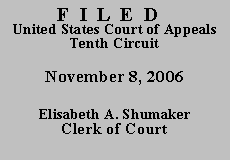

| UNITED STATES OF AMERICA, |
|
| v. | |
| ULYSSES HARPER, JR., |
(D.C. Nos. CIV-06-0007 JC/WPL and CR-96-220 JC) |
The district court correctly decided that the motion is not a proper Rule 60(b) motion but rather a motion under 28 U.S.C. § 2255. See United States v. Nelson, No. 06-6071, 2006 WL 2848113 (10th Cir. Oct. 6, 2006). The court also correctly noted that
"district courts should not recharacterize a motion purportedly made under some other rule as a motion made under § 2255 unless (a) the movant, with knowledge of the potential adverse consequences of such recharacterization, agrees to have the motion so recharacterized, or (b) the court finds that, notwithstanding its designation, the motion should be considered as made under § 2255 because of the nature of the relief sought, and offers the movant the opportunity to withdraw the motion rather than have it so recharacterized."
R. Doc. 2 at 2 (Mem. Op. & Order, Feb. 7, 2006) (quoting United States v. Kelly, 235 F.3d 1238, 1242 (10th Cir. 2000)) (further internal quotation marks omitted).
The district court then observed, however, that recharacterization would not prejudice Mr. Harper because his motion was untimely. See United States v. Martin, 357 F.3d 1198, 1200 (10th Cir. 2004). It therefore recharacterized his motion as one under § 2255 and dismissed the motion with prejudice as untimely.
Mr. Harper can appeal the district court's ruling only if we grant a certificate of appealability (COA). See 28 U.S.C. § 2253(c). He is entitled to a COA only if reasonable jurists could debate the district court's ruling. See Slack v. McDaniel, 529 U.S. 473, 484 (2000).
No reasonable jurist could debate the district court's ruling. We therefore DENY Mr. Harper's request for a COA and DISMISS the appeal. We also DENY his motion to proceed in forma pauperis.
ENTERED FOR THE COURT
Harris L Hartz
Circuit Judge
*.After examining the briefs and appellate record, this panel has determined unanimously that oral argument would not materially assist the determination of this appeal. See Fed. R. App. P. 34(a)(2); 10th Cir. R. 34.1(G). The case is therefore ordered submitted without oral argument. This order and judgment is not binding precedent, except under the doctrines of law of the case, res judicata, and collateral estoppel. The court generally disfavors the citation of orders and judgments; nevertheless, an order and judgment may be cited under the terms and conditions of 10th Cir. R. 36.3.